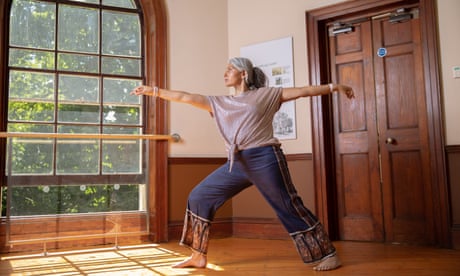‘Cultural appropriation’: discussion builds over western yoga industry
Practitioners fear Indian culture has been ‘suppressed by colonisation’ while some question accessibility

In 2019, the global yoga industry was worth an estimated $37.46bn.
Photograph: Thomas Barwick/Getty Images
Nadia Khomami
@nadiakhomami
Nadia Khomami
@nadiakhomami
Mon 12 Dec 2022
Yoga has been a big part of Nadia Gilani’s life since she was introduced to the practice by her mother at the age of 16. A few years ago, after various personal struggles, she became a full-time yoga teacher.
But almost immediately, she realised not only were most yoga teachers and students in the UK white, but the accompanying wellness narrative has divorced yoga from its 5,000-year-old roots.
“The lack of people of colour in the industry is a massive problem,” Gilani said. “There is a big issue with diversity, in terms of both teachers and those who practice it. What especially annoys me is when Sanskrit words like ‘namaste’ get emblazoned on T-shirts, images of Hindu gods are turned into tattoos, or ‘om’ symbols are printed on yoga mats. It’s cultural appropriation and it’s offensive.”
If her mother had not introduced her to yoga, Gilani wonders if she would have found it at all. “Flashy studios, costing up to £20 a class. It’s gatekeeping, in a way.”
This week, practitioners in India have once again sought to draw attention to what they see as cultural appropriation of yoga, amid allegations it has been whitewashed. Vikram Jeet Singh, a yoga instructor in Goa, told This Week in Asia that “his own culture” has been “wiped out and suppressed by colonisation”.
In the west, he added, yoga has “become synonymous with a workout session stripped of any kind of cultural background, where you have to show up with $100 Lululemon leggings and an equally expensive mat. That is not right”.
Yoga has developed from an underground practice to a multibillion-pound industry driven by celebrity fans such as Gwyneth Paltrow and Jennifer Aniston. In 2019, the global yoga industry was worth an estimated $37.46bn (£30.53bn).

‘Skinny, bendy and blonde’: women of colour challenge racism in UK yoga
Teachers of South Asian heritage in the UK, such as Nikita Desai, have posted videos claiming yoga has become “colonised” and inaccessible to many, the Times has reported. Online teacher Cat Meffan said she had to learn about issues around appropriation, which was not taught when she studied to be a teacher in 2014.
In her book The Yoga Manifesto: How Yoga Helped Me and Why it Needs to Save Itself, Gilani writes at length about the problems in the industry. But she said she did not like words such as “colonised” to describe the spread of the yogic practice.
“I don’t think claiming yoga back as an Indian practice for only Indians is the way,” she said. “These conversations have to be nuanced. It’s not as simple as saying ‘the west has nicked yoga’.
“I was born in the west, I’ve got a western practice and I’ve got a western modern life, which is why I think the call to ‘decolonise’ doesn’t quite work. I need my practice to fit with my modern life. Of course, I’m more sensitive because I had to deal with growing up as a person of colour in the west. But this isn’t about bashing white people – everyone has to be sensitive. I could easily make a mistake too, and what’s important is having those discussions afterwards.”
Yoga has been a big part of Nadia Gilani’s life since she was introduced to the practice by her mother at the age of 16. A few years ago, after various personal struggles, she became a full-time yoga teacher.
But almost immediately, she realised not only were most yoga teachers and students in the UK white, but the accompanying wellness narrative has divorced yoga from its 5,000-year-old roots.
“The lack of people of colour in the industry is a massive problem,” Gilani said. “There is a big issue with diversity, in terms of both teachers and those who practice it. What especially annoys me is when Sanskrit words like ‘namaste’ get emblazoned on T-shirts, images of Hindu gods are turned into tattoos, or ‘om’ symbols are printed on yoga mats. It’s cultural appropriation and it’s offensive.”
If her mother had not introduced her to yoga, Gilani wonders if she would have found it at all. “Flashy studios, costing up to £20 a class. It’s gatekeeping, in a way.”
This week, practitioners in India have once again sought to draw attention to what they see as cultural appropriation of yoga, amid allegations it has been whitewashed. Vikram Jeet Singh, a yoga instructor in Goa, told This Week in Asia that “his own culture” has been “wiped out and suppressed by colonisation”.
In the west, he added, yoga has “become synonymous with a workout session stripped of any kind of cultural background, where you have to show up with $100 Lululemon leggings and an equally expensive mat. That is not right”.
Yoga has developed from an underground practice to a multibillion-pound industry driven by celebrity fans such as Gwyneth Paltrow and Jennifer Aniston. In 2019, the global yoga industry was worth an estimated $37.46bn (£30.53bn).

‘Skinny, bendy and blonde’: women of colour challenge racism in UK yoga
Teachers of South Asian heritage in the UK, such as Nikita Desai, have posted videos claiming yoga has become “colonised” and inaccessible to many, the Times has reported. Online teacher Cat Meffan said she had to learn about issues around appropriation, which was not taught when she studied to be a teacher in 2014.
In her book The Yoga Manifesto: How Yoga Helped Me and Why it Needs to Save Itself, Gilani writes at length about the problems in the industry. But she said she did not like words such as “colonised” to describe the spread of the yogic practice.
“I don’t think claiming yoga back as an Indian practice for only Indians is the way,” she said. “These conversations have to be nuanced. It’s not as simple as saying ‘the west has nicked yoga’.
“I was born in the west, I’ve got a western practice and I’ve got a western modern life, which is why I think the call to ‘decolonise’ doesn’t quite work. I need my practice to fit with my modern life. Of course, I’m more sensitive because I had to deal with growing up as a person of colour in the west. But this isn’t about bashing white people – everyone has to be sensitive. I could easily make a mistake too, and what’s important is having those discussions afterwards.”
No comments:
Post a Comment